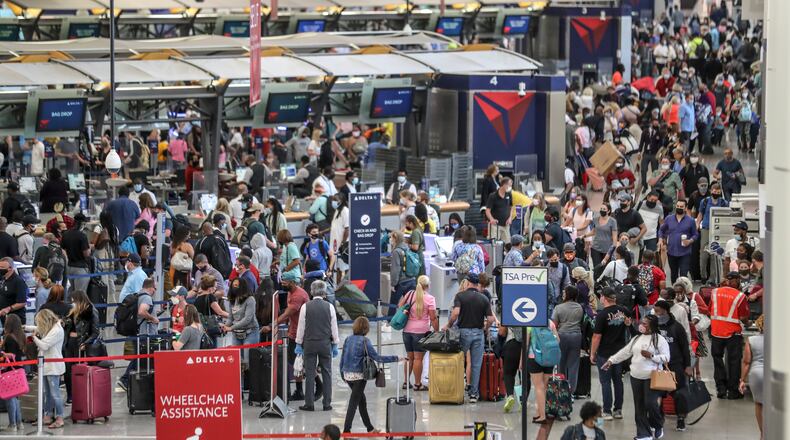Growing crowds of vacationers filling U.S. airports are helping put Delta Air Lines on a route to recovery, but weak corporate and international travel means it’s still far from business as usual.
The Atlanta-based airline said Wednesday it is pointed back to profitability after the pandemic sent air travel plunging last year.
In another good sign, it reported domestic leisure travel has rebounded to 2019 levels, with momentum picking up in June as summer travel kicked in.
“We had a very strong month,” said Delta CEO Ed Bastian in an interview with The Atlanta Journal-Constitution, adding the airline expects to post pre-tax profits in the final two quarters of the year.
But Delta’s net income of $652 million in the quarter ended June was boosted by roughly $1.5 billion in federal relief funding.
And second-quarter revenue of $7.1 billion, while up sharply from a year ago, was still down 43% from the second quarter of 2019.
Delta started making middle seats available again on its planes on May 1 as more passengers booked flights and COVID-19 infection rates fell.
The rush of travelers this summer has caused bottlenecks as companies struggle to keep up with the rebound of traffic.
Delta is hiring reservations employees, as well as workers in airports to supplement contractors that clean planes and handle wheelchairs. “We’ll continue to maintain that until we’re confident that the service providers can start to assume more of that work,” Bastian said. “It’s been very difficult to keep our staffing at a complement that we’re satisfied with.”
While domestic leisure travel brings crowds to airports, large global carriers like Delta have long relied on business travelers and international flights, where they can charge more.
Corporate travel volumes doubled from March to June, but remain 60% below pre-pandemic levels, according to Delta.
Cross-border travel restrictions also continue to weigh on financial results, with rising fuel costs and the spread of the Delta variant of COVID-19 posing new challenges.
“The variant is causing a delay in the international markets reopening,” Bastian said. “It really hasn’t had any effect on our U.S. booking volume.”
Delta expects its flight capacity will be down 28% to 30% and revenue down 30% to 35% in the third quarter compared with 2019.
Meanwhile, Delta’s finances are also affected by investments in other areas. The company’s oil refinery in Pennsylvania lost money in the quarter, primarily due to higher expected costs of required renewable fuel credits. Delta is lobbying the Biden administration for relief from the requirement.
Bastian said Delta’s investments in two other companies are worth nearly $1 billion: Biometric screening company Clear, which went public at the end of June, and private jet charter company Wheels Up, which went public Wednesday.
Competitors United and American have announced investments in electric “air taxi” types of aircraft. Bastian said the market is “at a very, very early stage right now,” adding, “We’re in the marketplace having lots of conversations.”
About the Author
The Latest
Featured



